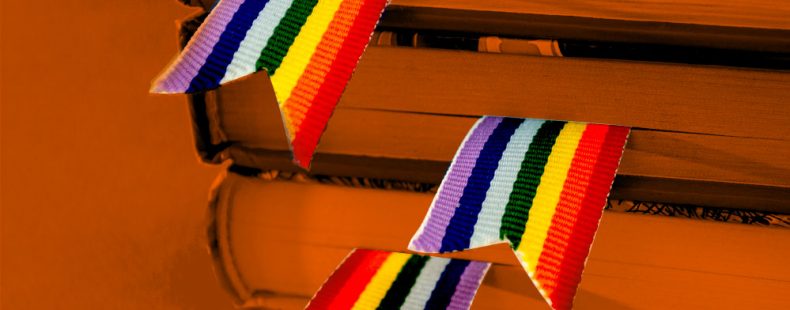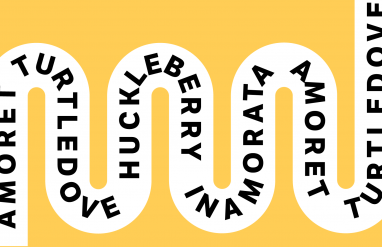The act of writing, like any form of creative expression, is a way that people work out their ideas and their identities. This is particularly true for LGBTQ people throughout history. Writers such as James Baldwin, Gertrude Stein, and Alice Walker, drew on their experiences to illuminate the world for everyone. The words of these and other LGBTQ writers help us understand difficult concepts like love, hope, and liberation, and how we can cultivate them in our own lives, even in the face of oppression.
1.
To be shamed before you can defend yourself does not mean to experience shame. This moment of queer pride is a refusal to be shamed by witnessing the other as being ashamed of you.
—Sara Ahmed, The Promise of Happiness, 2010
pride
In this quote from lesbian writer and academic Sara Ahmed, she sums up well what queer pride is and why it’s important—there are those who are ashamed to see others be openly queer, but we do not have to share in their shame. Pride in this sense has multiple meanings. It can be understood in the general sense, “a high or inordinate opinion of one’s own dignity, importance, merit, or superiority, whether as cherished in the mind or as displayed in bearing, conduct, etc.” In this context, however, it also refers to capital P Pride, “recognition of LGBTQ identity, affirmation of equal rights, and celebration of visibility, dignity, and diversity in the LGBTQ community.”
2.
Love who you want to love, and do it unapologetically, including that face you see every day in the mirror.
—George M. Johnson, All Boys Aren’t Blue: A Memoir-Manifesto, 2020
unapologetically
On a similar note as Sara Ahmed, author George M. Johnson writes in his memoir about being a queer Black boy that one should love others and oneself unapologetically, “in a way that does not accept fault or shows no regret or shame.” The word apology comes from the Greek apología, meaning “speech in self-defense.” To act unapologetically is to do something as if you have done nothing wrong or have nothing to justify to anyone else.
3.
One discovers the light in the darkness, that is what darkness is for; but everything in our lives depends on how we bear the light. It is necessary, while in darkness, to know that there is a light somewhere, to know that in oneself, waiting to be found, there is a light. What the light reveals is danger, and what it demands is faith.
—James Baldwin, Nothing Personal, 1964
bear
James Baldwin was a gay Black writer who used his position as an outsider to write searing commentary and analysis of American culture and politics. In a project with Jewish photographer Richard Avedon, titled Nothing Personal, Baldwin wrote this call to action about the need to search for love and goodness in life. The verb bear here has a variety of meanings. It can mean “to hold or carry,” but it can also mean “to suffer.” This suggests that Baldwin is acknowledging that this work will not be easy.
4.
I live proudly in a body of my own design. I defend my right to be complex.
—Leslie Feinberg, Trans Liberation: Beyond Pink or Blue, 1998
complex
Leslie Feinberg is most famous for her debut novel about a working-class dyke, Stone Butch Blues. In her 1998 book Trans Liberation, Feinberg wrote about her right to be complex, a word with various meanings including “so complicated or intricate as to be hard to understand or deal with.” The word complex ultimately comes from the Latin complectere meaning “to embrace, encompass, include.” With this in mind, the right to be complex is the right to embrace all of one’s identity.
5.
I believe in a world where impossible things happen. Where love can outstrip brutality, can neutralize it, as though it never was, or transform it into something new and more beautiful. Where love can outdo nature.
—Carmen Maria Machado, from “Mothers” in Her Body and Other Parties, 2017
outdo
In the short story collection Her Body and Other Parties by queer writer Carmen Maria Machado, a new mother expresses her feelings about love and possibility. The verb outdo means “to surpass in execution or performance.” The word outdo is a close synonym of outstrip, “to surpass; excel,” which can be found in the previous sentence. Without giving too much about this surreal story away, the mother turns out to be right.
6.
Sweet mother, I cannot weave—
slender Aphrodite has overcome me
with longing for a girl.
—Sappho, c. 6th century, trans. Diane Raynor, 2014
longing
Sappho [ saf-o ] was a 6th century lyric poet from Lesbos, in ancient Greece. She is closely associated with love and desire between women (see, for example, the origins of the words lesbian and Sapphic), although her own sexuality remains contested among scholars. For many years, translations of Sappho’s poetry into English were “heterosexualized.” For instance, the word “girl” in this excerpt had previously often been translated as “boy.” Raynor’s choice of “girl” changes the meaning and implications of longing, “strong, persistent desire or craving, especially for something unattainable and distant,” quite a bit.
7.
Disobedience, in the eyes of any one who has read history, is man’s original virtue. It is through disobedience that progress has been made, through disobedience and through rebellion.
—Oscar Wilde, “The Soul of Man Under Socialism,” 1891
disobedience
Oscar Wilde, author of The Picture of Dorian Gray, was not only a writer but an activist. He encouraged disobedience, “lack of obedience or refusal to comply; disregard or transgression,” in the face of unjust laws or governance. While he was not referring to so-called morality laws in this quote, he may as well have been; in 1895, Wilde was tried for homosexuality and served two years in prison for his “crime.”
8.
The way I see it, life is about growth, struggle, and trying to expand your love of self and of other people. Also to really try hard not to cause harm—to cultivate a way of life that is harmless.
—Alice Walker, interview in Ms. magazine, 1999
cultivate
Alice Walker is a bisexual Black writer most famous for her novel The Color Purple (1982). The verb cultivate here means “to promote the growth or development of (an art, science, etc.); foster.” However, cultivate can also mean “to promote or improve the growth of (a plant, crop, etc.) by labor and attention.” This double meaning of cultivate resonates with the idea of creating a better “way of life.”
9.
We … write to heighten our own awareness of life. We write to lure and enchant and console others. We write to serenade our lovers. We write to taste life twice, in the moment, and in retrospection.
—Anaïs Nin, The Diary of Anaïs Nin, Vol. 5, 1954
retrospection
Anaïs Nin was a prolific diarist who also wrote novels and erotica. In this passage, she explains why writers write. As a diarist, she in particular is focused on retrospection, “the action, process, or faculty of looking back on things past.” Retrospective, therefore, means “looking backward,” although it is often used as a noun to mean “an art exhibit showing an entire phase or representative examples of an artist’s lifework.”
10.
To be regularly gay was to do every day the gay thing that they did every day. To be regularly gay was to end every day at the same time after they had been regularly gay.
—Gertrude Stein, “Miss Furr and Miss Skeene,” Vanity Fair, 1923
gay
The short story “Miss Furr and Miss Skeene” by Gertrude Stein is one of the earliest examples of gay being used to refer to a female romantic couple in print. Stein is well-known for her love of wordplay. Here, she plays on the dual meaning of gay, “having or showing a merry, lively mood” and “of, relating to, or exhibited sexual desire or behavior directed toward people of one’s own sex or gender.”
11.
Can you understand? Someone, somewhere, can you understand me a little, love me a little? For all my despair, for all my ideals, for all that—I love life.
—Sylvia Plath, The Unabridged Journals of Sylvia Plath, July 1950-July 1953
ideals
Poet and novelist Sylvia Plath had a tragically short life during which she often struggled with depression. Here, she writes about how she remains positive despite her ideals, “a standard of perfection or excellence.” The word ideal ultimately comes from the Greek idéā meaning “form, pattern.” Something that is ideal perfectly conforms to a form or standard.
12.
As a Black lesbian mother in an interracial marriage, there was usually some part of me guaranteed to offend everybody’s comfortable prejudices of who I should be. That is how I learned that if I didn’t define myself for myself, I would be crunched into other people’s fantasies for me and eaten alive.
—Audre Lorde, “Learning from the 60s,” speech at Harvard University, 1982
define
Speaking about the legacy of the Black Power movement, writer and poet Audre Lorde talks about the importance of defining oneself. The verb define has a variety of meanings, including “to explain or identify the nature or essential qualities of; describe.” Define can also mean “to determine or fix the boundaries or extent of.” Establishing clear boundaries is an important part of self-definition.
The words of these LGBTQ authors remind us to remain hopeful, grounded, and strong. No matter our background, we can appreciate the wisdom and insight they offer.













